On Drifting and Rooting: The Wonders of Wandering
On 25 February 2023, at the fifth iteration of PhotoKTM, Karachi-based artist Fazal Rizvi and writer, researcher and curator Aziz Sohail, invited the audience to their lecture performance, On Drifting and Rooting, to reflect on the importance of coming together to tell our stories. The artists took to the stage of the Yala Maya Kendra in Patan, Nepal, to talk about their practice and how they have been impacted by the knowledge of each other and the communities they have, over time, formed, engaged with and been part of.
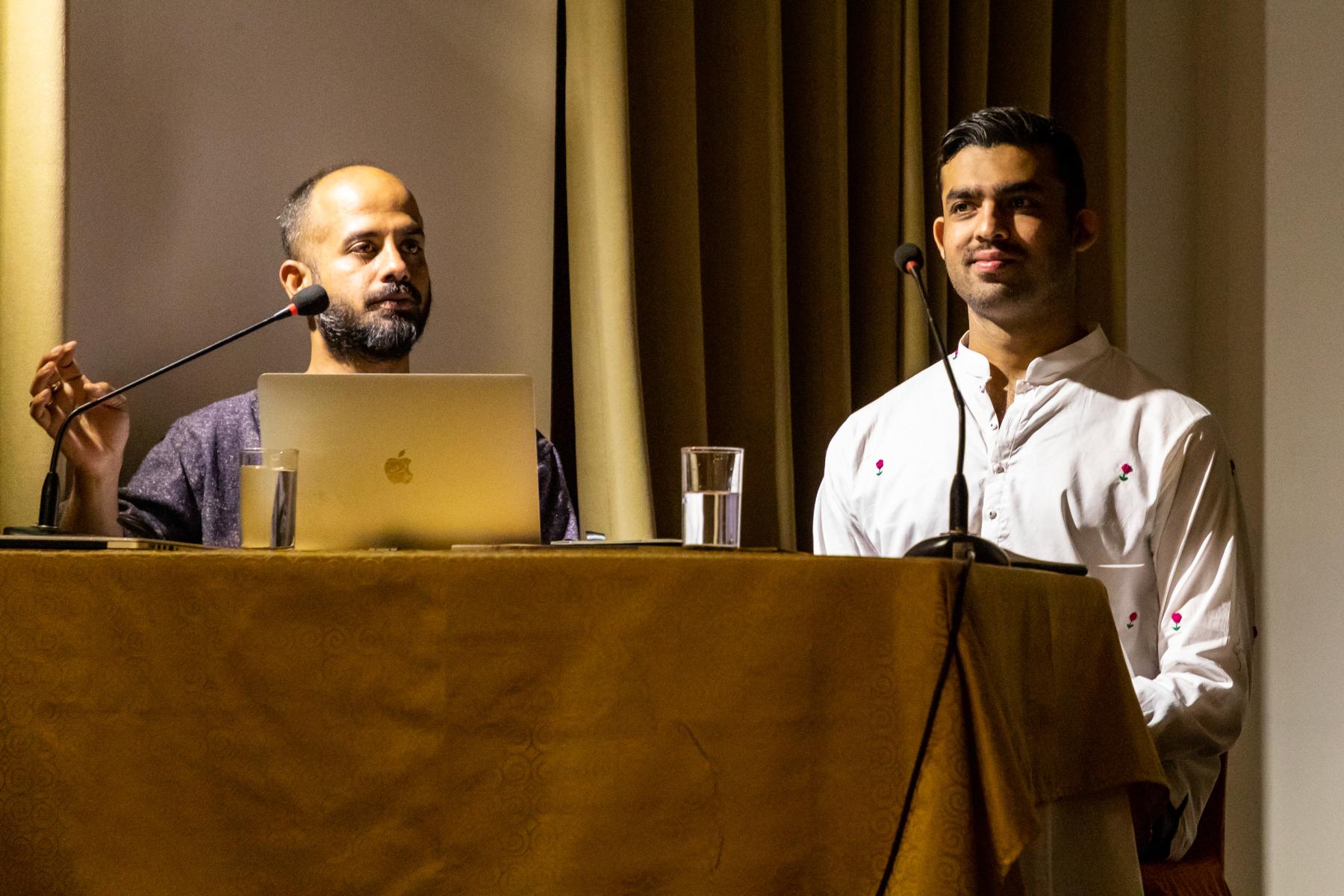 Rizvi and Sohail rendered their presentation outside of the usual academic format. The two sat at the corner of the stage with their laptops and notes on their narration and reference points. Their presentation screen turned to reveal chapters—their artworks and moments in their lives. These were accompanied sometimes with minutely-sized words like “arrival”, “adrift” or “community/grounding/rooting”, in stark contrast to typical slides, which call for presenters to use large fonts, and other times with pictures.
Rizvi and Sohail rendered their presentation outside of the usual academic format. The two sat at the corner of the stage with their laptops and notes on their narration and reference points. Their presentation screen turned to reveal chapters—their artworks and moments in their lives. These were accompanied sometimes with minutely-sized words like “arrival”, “adrift” or “community/grounding/rooting”, in stark contrast to typical slides, which call for presenters to use large fonts, and other times with pictures.
With clear intent, the Karachi-based artists prompted the audience to meditate with them. Deviating from their arranged papers to their memories and experiences, in between poetic reflections, they took turns emphasising how their artistic practices were formed through pockets of their lives that entangled with one another and the people they found solace with. The duo narrated their efforts to find and define themselves—with the people and community—after returning to their hometown, which they were yet to unpack.
In an email exchange with the writer, Rizvi elaborated:
“The idea of the lecture performance was to think about and reflect on the last few years that we have been in Karachi, a place that we both had returned to around 2013, and we really wanted to think about what it meant for us to come back and the people and community that we found in the moment... This community actually helped us find our roots and ground ourselves in place and context. And to start thinking, moving, doing, making collectively or/and in conversation and collaboration with each other.”
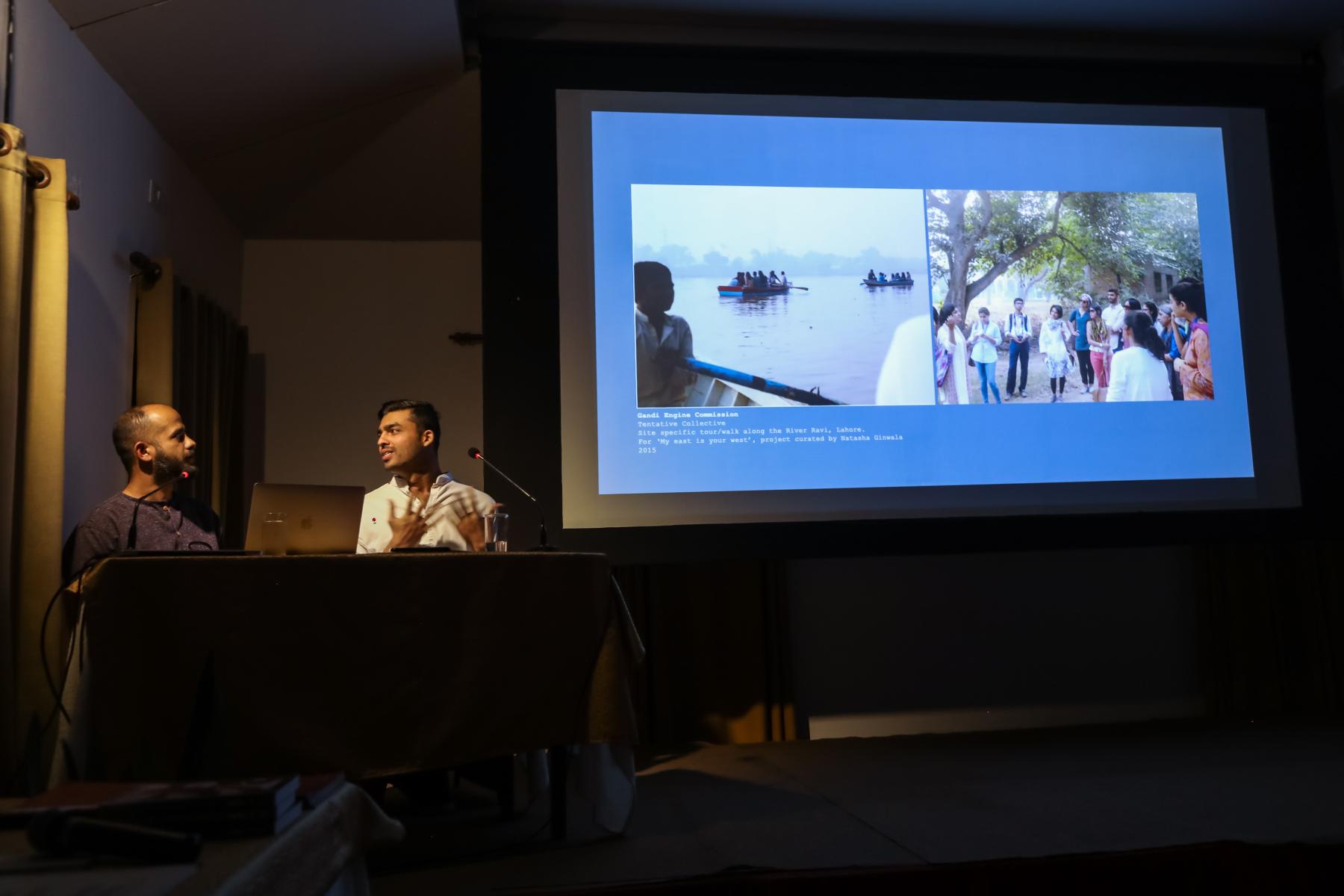
Rizvi has worked across different mediums since 2013 to bring out art that is personal as well as social and political. His works delve into many facets of our lives—of what we are dividing, remembering, trying to hold, and taking away from our landscapes. For a significant amount of time, he has explored these ideas through the features and characteristics of rivers and seas, like their fluidity.
On the other hand, Sohail has been inclined towards bringing ideas together—sometimes in the form of making connections with people and exploring the intersection of sexuality in relation to identity, social history, colonialism and migration. Through the years, he has also produced work as a writer, researcher and curator. He has recently launched the periodical Kal Rituals with The Many-Headed Hydra, a collective that explores queer and trans-feminist relationships, accounts and experiences.
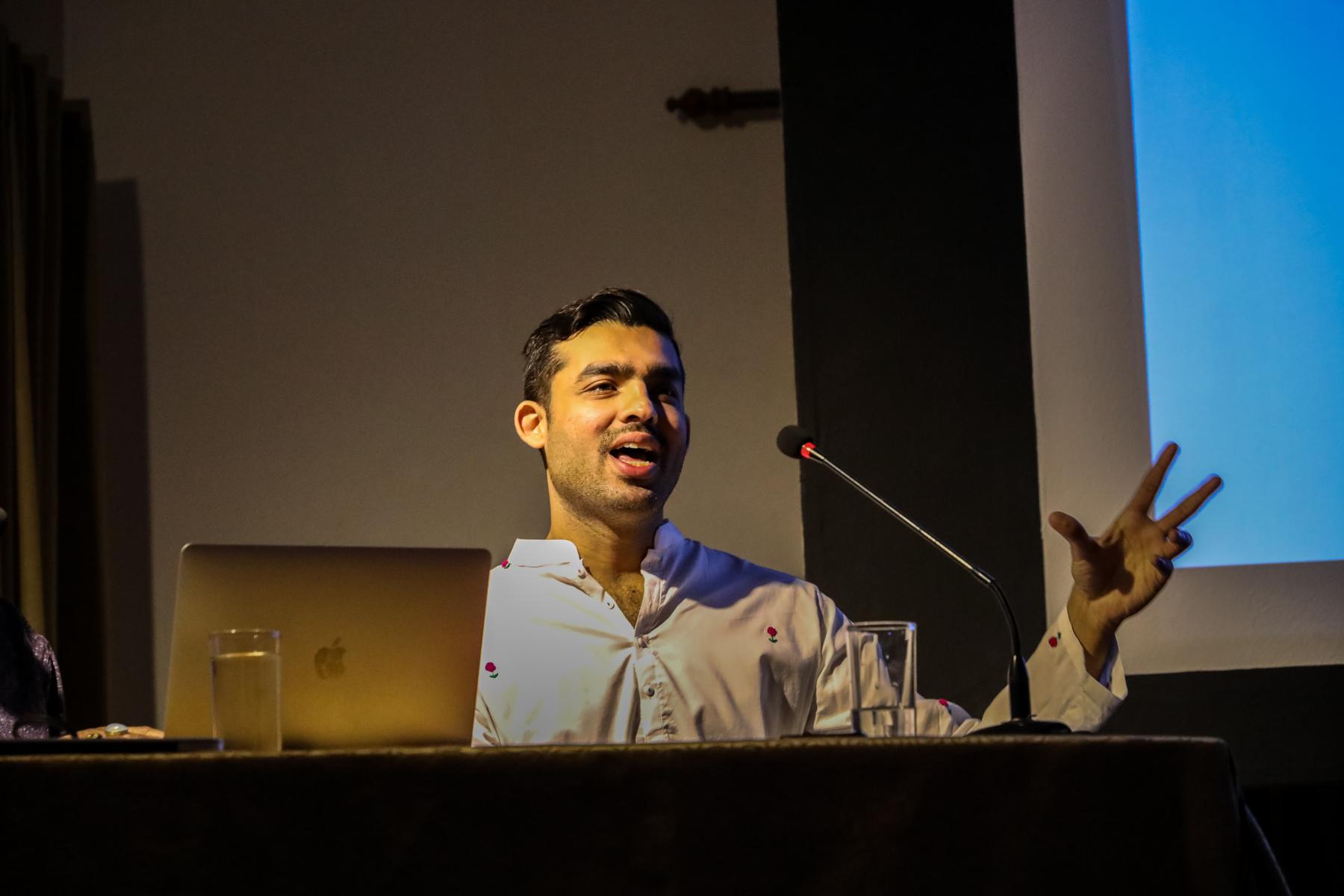
Rizvi and Sohail tried to weave their individual and collective journeys during the presentation. The lecture brought to attention how their lives have continually converged and diverged. As they have changed with time, they have come to mean more to each other, especially as people who help the other remain rooted in their work and ideas within the vast realm of visual art practices. Rizvi and Sohail’s lives intertwined time and again, first when they met in 2013 as people who wanted to learn from each other before separating to develop their individual practices, reflecting the serendipity of life.
Their encounter began with an informal initiative that brought together artists—including their friends, colleagues and strangers—to visit places in Karachi without any agenda. At the time, the idea behind this initiative was to drift and create connections with whatever made sense to them. Over time, these “Karachi hangouts” expanded and dispersed as they invited more people to join and make more currents.
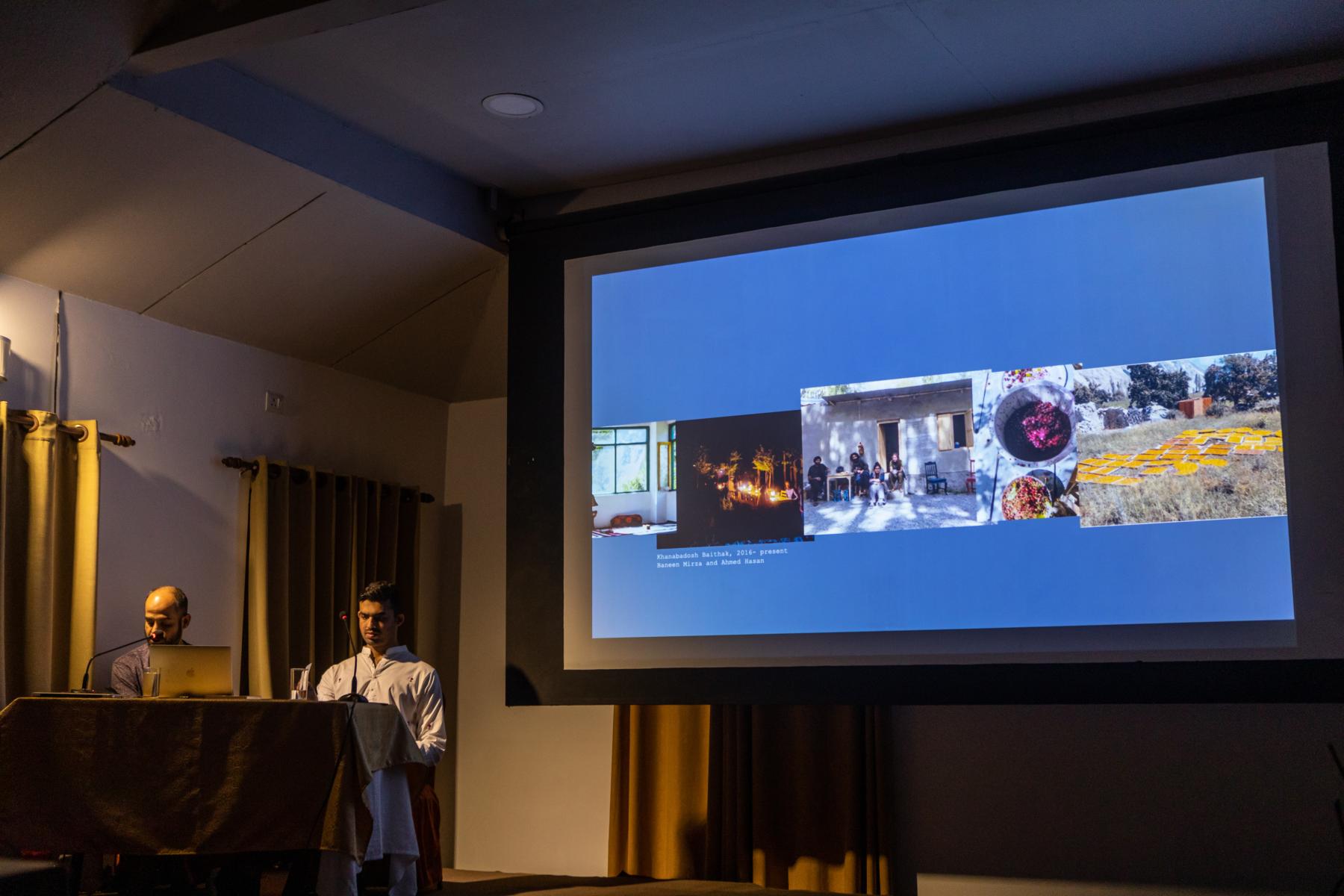
During the performance, Rizvi talked about discovering an even older art collective, The Tentative Collective, who would meet to inspire each other before their own group was formed. In this circle of people, while Rizvi explored the understanding of life through the fluidity of water, chased after the sounds of glaciers, and reflected on the failures of making art, Sohail simultaneously experienced his own relationship to his practice, as he discovered his love for publishing as a space to discuss art, feminism, queerness, appropriation and the language of place, with artists and writers from across South Asia.
While one may be afraid to meander in life without objective(s), Rizvi and Sohail explicate why sometimes floating in moments and with people can help connect us to our roots and beliefs. They invited the audience to ponder some open questions such as: “What does it mean to be adrift? To be in a state of flux? To penetrate the idea of what happens as we grow, shift and move.”
Their lecture performance ended abruptly, in the midst of unravelling and becoming. There is no concrete conclusion to what is happening now. Their future remains uncertain, yet hopeful. With this, the duo marked what they called a humble conclusion to their lecture: the possibilities generated through collaboration and interaction across communities. Rizvi and Sohail captured the poetic essence of finding community, tying into the larger ethos of the PhotoKTM5 Festival that aims to foster a community of storytellers that inspire each other. “Coming together is something that really allows one to find support and create spaces too. It allows one to dream and do things differently,” Rizvi enumerated. “We see that happening in the festival, where this amazing team is able to come together and do such important work that is grounded and yet is able to create a space for dialogue within and beyond this place.”
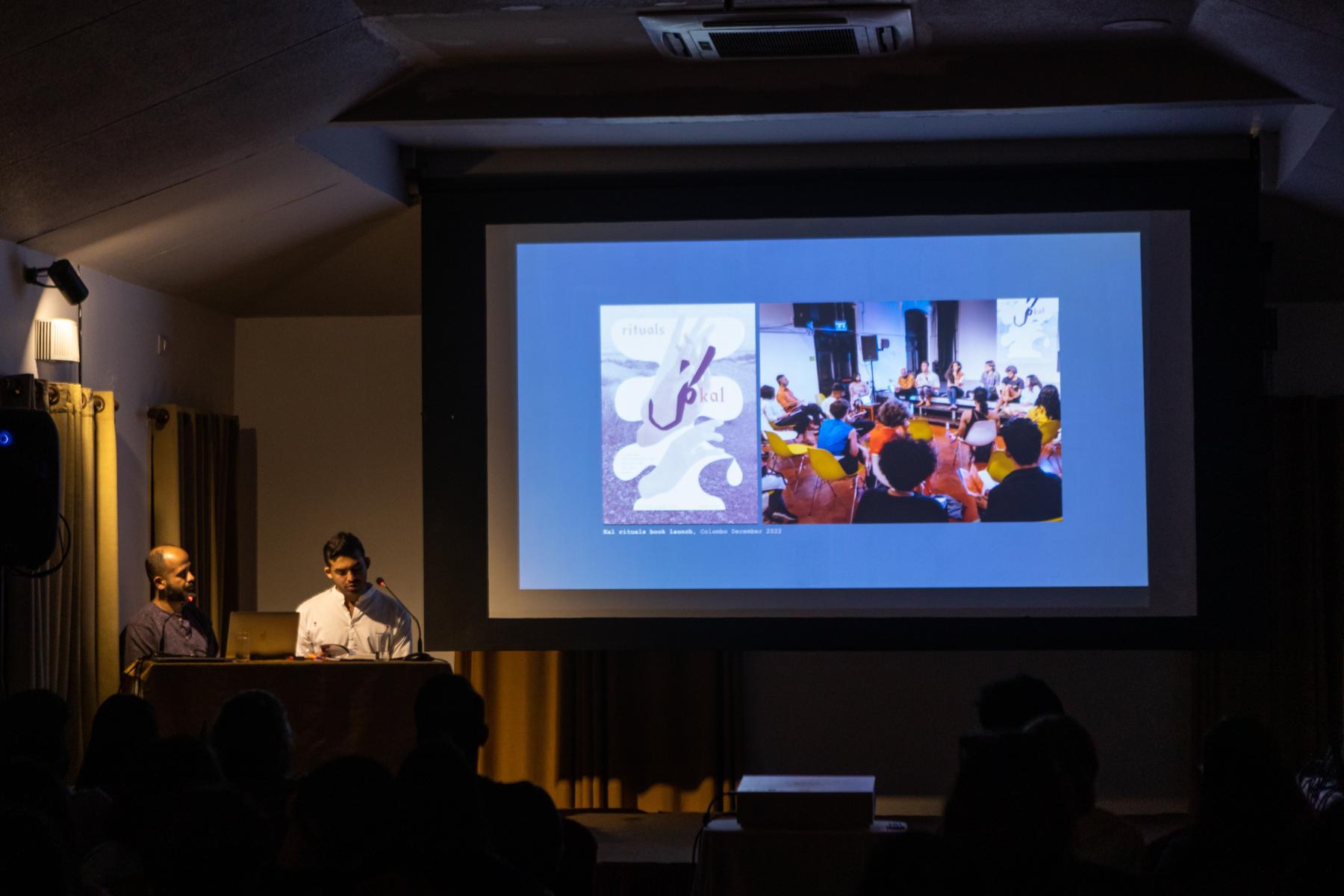
We spoke to Gang Limbu and Kishor K Sharma from the KTK Belt Project, who are exhibiting their work at this year's Photo Kathmandu. Additionally, revisit Anisha Baid's essay on the online iteration of The Skin of Chitwan, which is on display as a physical exhibit at this year’s PhotoKTM5.
All images from the lecture performance by Fazal Rizvi and Aziz Sohail at Yala Maya Kendra, Patan. Images by Miao Emma He and Samagra Shah. Courtesy of PhotoKTM5.




